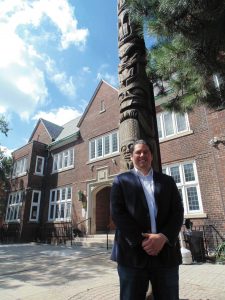
PHOTO BY BRIAN BURCHELL/GLEANER NEWS: The manager of cultural programming at the Native Canadian Centre of Toronto, Michael Etherington (above), suggests that introducing Indigenous teaching techniques to U of T could prompt “a complete paradigm shift” in which educators “take a step back and rethink our entire education system from the foundation upwards”.
By Annemarie Brissenden and Clarrie Feinstein
The University of Toronto (U of T) steering committee mandated with prioritizing the institution’s response to the Truth and Reconciliation Commission of Canada (TRC) released its Interim Report last month, just as the Native Students’ Association launched a petition to implement a mandatory Indigenous studies credit across all levels of education at the university.
The TRC has a mandate to inform all Canadians of the impact Indian Residential Schools continues to have on those placed in these institutions. Dating to the 1870s, the government-funded, church-run schools were set up, as the TRC’s website notes, “to eliminate parental involvement in the intellectual, cultural, and spiritual development” of more 150,000 Aboriginal children. The commission is part of the Indian Residential Schools Settlement Agreement that resulted when former residential school students took the federal government and churches to court. It is the largest class-action settlement in Canadian history.
Jonathan Hamilton-Diabo, the director of Aboriginal Student Services at First Nations House and the coordinator of the Council for Aboriginal Initiatives, co-chairs the Steering Committee for the U of T Response to the Truth and Reconciliation Commission of Canada with Professor Stephen J. Toope, director of the Munk School of Global Affairs. The rest of the committee includes staff, faculty, and students, as well as well two Indigenous Elders, Traditional Teacher Lee Maracle and Elder in Residence Andrew Wesley. The university’s president Meric Gertler and vice president and provost Cheryl Regehr established the committee in January of this year, following the TRC’s release of its final report, which included 94 calls to action, among them many education-related reforms.
These include eliminating education gaps between Aboriginal and non-Aboriginal Canadians; developing culturally appropriate curricula; establishing senior-level positions in government dedicated to developing Aboriginal content in education; integrating Indigenous knowledge and teaching methods into post-secondary classrooms; and requiring all law students to take a course in Aboriginal peoples and the law.
The committee did not make any initial recommendations in its interim report, but did summarize its primary achievements since January. It has developed an inventory of existing Indigenous-themed programs and initiatives across the university, and established five working groups that will focus on five areas: Indigenous curriculum; Indigenous students; Indigenous faculty and staff; Indigenous co-curricular educations; and Indigenous research ethics and community relationships. The working groups — some of which will be voluntarily guided by an Indigenous elder — must report by mid-October, in time for the committee to complete and submit its final report to the U of T by December 31.
The report comes just as the university’s Native Students’ Association has raised a petition asking U of T to support the implementation of a mandatory Indigenous studies credit across all of levels of education. The association, which has been working on this for two years and recently met with both the Minister of Aboriginal Affairs and the Premier of Ontario’s office, has to date received 1,545 signatures in support of its petition.
In Canada, two universities — the University of Winnipeg and Lakehead University in Thunder Bay — have adopted this approach and, starting in September, will require all undergraduates to complete a three-credit course in Indigenous culture or history in order to attain a degree.
“Indigenous education is a way of life, which is hard to distill in a classroom setting”—Michael Etherington, NCCT
However, Michael Etherington, the manager of cultural programming at the Native Canadian Centre of Toronto, believes implementing such an initiative will not be without its challenges.
“What will be difficult is how Indigenous teachings and practices will be incorporated into a methodology,” he said. “There are 50 to 60 groups within Indigenous communities. How can they all be represented to make it fully inclusive? Indigenous education is a way of life, which is hard to distill in a classroom setting.”
Etherington added that any curriculum must be grounded in historical events, which are key to understanding how Indigenous communities got to where they are today.
And, Etherington noted, while the U of T represents academic rigour and excellence, it is also endemic of traditional Western values that are in conflict with Indigenous teachings. “These academic institutions perpetuated certain stereotypes and perspectives on Indigenous people for a long time,” he explained. “The university can go down two avenues. The first is a process of revaluation, which is to revise a few practices, alter a couple of courses, etc. The second is to have a complete paradigm shift and to take a step back and rethink our entire education system from the foundation upwards.”
The committee’s interim report suggests that a paradigm shift is not on the horizon for the university; rather, its focus is more on engaging with Indigenous students, alumni, faculty, and staff, as well as including “where appropriate” Indigenous content into the curriculum.
It has acknowledged that three assumptions will underpin its final report: the recommendations will be forward-thinking and action-oriented with tangible goals that are well defined; that the university should graduate more Indigenous students and be “worthy” in every respect of these students; and that reconciliation is a long-term and continuous process.
